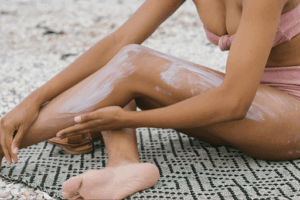5 common sunscreen myths you should stop believing
Sunscreen facts your group chat is probably getting wrong
The internet is flooded with sunscreen myths, and let’s be real, some of them are potentially extremely harmful. Whether it’s skipping SPF on cloudy days, relying on makeup with SPF or thinking sunscreen is only for beach trips, these misconceptions are putting your skin at risk.
The truth is, sunscreen is the holy grail of your skincare routine, shielding your skin from premature aging, hyperpigmentation and skin cancer. But with so much misinformation out there, it’s no wonder people get confused.
We’re breaking down five of the most common sunscreen myths to set the record straight – so you can protect your skin with confidence every single day.
Myth 1: Sunscreen is only for sunny days
UV rays don’t take a day off, even when the sun’s hiding. Up to 80% of UV rays can pass through clouds, and UVA rays penetrate windows, making indoor exposure a major culprit for skin damage.
Fun (or scary fact): UV rays are responsible for up to 80% of visible aging, including wrinkles, fine lines and sagging. If youthful, radiant skin is your goal, sunscreen is the single most important “anti-aging” product in your routine. Rain or shine, indoors or outdoors, SPF is your skin’s ultimate shield.
Myth 2: Good sunscreens leave a white cast
Not all sunscreens make you look like a ghost, we promise. Advanced formulations, like Face Republic’s Purity Sun Essence, use micronised or transparent mineral filters to leave zero white cast while still providing maximum protection.
These lightweight, sheer and completely invisible formulas are perfect for all skin tones and blend like a dream. Plus, they’re designed to work well under makeup, so you can protect your skin and keep your glow intact – no chalkiness in sight.
Myth 3: People with darker skin tones don’t need sunscreen
While melanin does offer some natural UV protection, it’s minimal – equivalent to an SPF of around 13, at best. This isn’t enough to prevent the long-term effects of UV exposure, like hyperpigmentation, sunburns and even skin cancer (yes, it happens in darker skin tones, too).
Daily sunscreen helps prevent uneven skin tone and discoloration, which are often more noticeable and harder to treat in darker complexions. Protect your glow and your skin health – SPF is not optional.
Myth 4: Sunscreen causes breakouts and clogs pores
Take it from us, this myth is SO outdated. Modern sunscreens are formulated with acne-prone skin in mind. Non-comedogenic options, like Face Republic’s Purity Sun Essence, are free from pore-clogging ingredients and feel ultra-light on the skin. Many also include soothing components like niacinamide or aloe vera to calm redness and irritation.
Bonus: By shielding your skin from UV damage, sunscreen can even help reduce post-acne marks and prevent flare-ups triggered by sun exposure.
Myth 5: Natural or mineral sunscreens aren’t as a effective as chemical ones
The truth is, mineral sunscreens are just as effective – if not more – when used correctly. Unlike chemical sunscreens, which absorb UV rays and convert them into heat, mineral sunscreens physically reflect UV rays off your skin using ingredients like zinc oxide and titanium dioxide. This creates an immediate barrier to harmful rays, offering broad-spectrum protection.
Not only are they gentle enough for sensitive skin, but their reef-safe formulas make them better for the environment, too. So yes, you can have powerful, effective sun protection that’s good for both your skin and the planet.
Your skin called, it wants SPF
The takeaway? Sunscreen is non-negotiable. Every skin tone, every season, every single day. Ignore the myths and try smarter sun care with Face Republic’s Purity Sun Essence and Full Bloom Sun Tint. Lightweight, reef-safe and skin-friendly, they make SPF ridiculously easy. Your future self will appreciate it!



